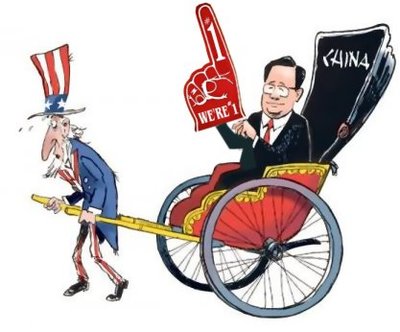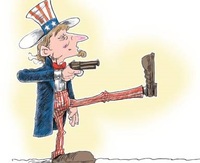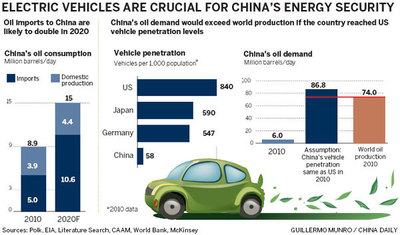No April Fool Joke: Chinese Bio Weapon Covid-19 Magnifies China Ability To Gain Worldwide EV Domination - Updated
 China Number 1 In EV Future |
The following is an Auto Channel Green Wheels Report; relevant content for car shoppers and auto enthusiasts concerned with alt-fuels, fuel economy, hybrid vehicles, electric vehicles, fuel-cells and saving our planet by reducing exhaust emissions
• SEE ALSO: Forbes: Chinese Electric Cars Will Take Over The World – If We Let Them
• SEE ALSO: China EV News Library (Warning Do Not Read If You Have A Heart Problem and Care About America)
Originally Published June 2018; Updated When We Get Pissed Off Enough
TACH's TAKE: Because most elected politicians are just too ignorant about alt fuels or are in Big Oil's pocket to make make an independent alt fuel decision, they delegate "their alt fuel position" decision to just as ignorant "expert" aides to determine which 'alt' to support, and because it's in vogue and they think safe, they support Electric vehicles. So these know nothings hurt America and help China...just look at the support and money being spent on Electric vs Ethanol a real gasoline alternative.
Think we are paranoid? Well wake the f--k up! It's in Silicon Valley's and China's best interest to emasculate automobiles and create a ground swell for a "Transportation Appliances" industry that replaces traditional automobile design and manufacturing. In a new electric and autonomous transportation world they can both dominate, just how many Chinese citizens with advanced degrees earned at American universities are employed at digital transportation companies in Silicon Valley?
China is called the future Silicon Valley of the electric vehicle world
Nov. 28, 2020 10:28 AM ET - BYD Company Limited (BYDDF), By: Clark Schultz, SeekingAlpha.com Editor, comments:
-
• Loup Ventures estimates that electric vehicle deliveries in China will grow to 3.5M in 2023, 5.1M in 2025 and 13.3M in 2035 if Beijing stays supportive.
• Loup's breakdown: "As the biggest EV growth market over the next decade, China represents the single largest opportunity for EV makers. The country wants its automakers to expand outside of the region and sell globally. To do that, China needs Tesla. That's of course good for Tesla, and we believe by 2025 China can account for 35% of Tesla auto deliveries, up from about 25% today."
• Loup on China's EV plan: "Attract the global leader in EVs and let that company invest in China-made battery tech, support local parts makers, and most importantly, hire Chinese talent and let them learn from the best. Eventually, these employees will leave Tesla and start their own EV companies, join Chinese auto parts makers, or pair up with OEMs like BYD, GAC, and Nio."
• Will that work? The firm notes that Silicon Valley traces its roots back to one company, Fairchild Semiconductor in the late 1950s, from which decades of innovation of sprung.
• As far as the here and now, the bigger EV manufacturers in China during the first half of 2020 by volume were BYD (OTCPK:BYDDF), Tesla (NASDAQ:TSLA), Volkswagen (OTCPK:VWAGY) via SAIC/FAW/JAC, General Motors (NYSE:GM) via SAIC, GAC Group and Nio (NYSE:NIO). Other manufacturers scrapping for EV market share include Great Wall Motors (OTCPK:GWLLF), BMW (OTCPK:BMWYY), Geely Automobiles (OTCPK:GELYF), Kandi Technologies (NASDAQ:KNDI), Chery Automobile, XPeng (NYSE:XPEV), WM Motor and Li Auto (NASDAQ:LI).
• Tesla closed the week with a market cap of $555B. Toyota (NYSE:TM) is the only other automaker with a cap over $100B. Volkswagen and Nio rank third and fourth on the list.
Major Issues Arise with California's New EV Proposal
Hello Editorial Board
The Auto Channel
I'm sure you're well aware of the recent announcement from California that will require all passenger vehicles sold to be zero emission by 2035. While the plan may seem forward-thinking to some, Lewis Black, CEO of Almonty Industries says new challenges lay ahead for the EV industry.
EV batteries are dependent on the lithium ion batteries, an industry that is widely controlled by China, posing a big challenge for this California EV initiative. In fact, last week President Trump signed an executive order declaring a national emergency on critical precious metals and minerals that are detrimental to the manufacturing of Electric Cars and even cell phones.
Almonty is a tungsten mining company that is one of the only direct raw materials competitors to the Chinese market. Tungsten is a rare earth critical mineral that is used in the lithium-ion batteries that power Electric Vehicles (EVs). Without tungsten, the batteries cannot be made (among other medical products etc).
This is important because China currently monopolizes the majority of tungsten mining, and they are dominating the lithium-ion battery market. By 2025, it’s likely they will surpass the US and Europe in production, meaning most of the EV market will once again rely completely on China. If it’s not for the EV batteries themselves, it could be for the tungsten component.
Editor's Note: New EV Corporate Welfare Proposed - WTF?:
- New legislation is expected to be introduced by a group of bipartisan (Stupid Self Serving Politicians From Auto Making States; Democrats Senators Debbie Stabenow and Gary Peters, Republican Senators Lamar Alexander and Susan Collins) lawmakers to expand the electric vehicle giveaway tax credit by 400K vehicles per manufacturer.
- Their "Driving America Forward Act" would give each automaker a $7K tax credit for an additional 400K vehicles in addition to the current 200K vehicles eligible for the $7.5K tax credits. The phase-out period would be shortened to nine months. The legislation would also extend the hydrogen fuel cell credit through 2028.
Electric Car Sales Fall for First Time After China Cuts Subsidy
September 3, 2019; Yahoo said that Bloomberg reported that Global electric-car sales fell for the first time in modern history in July after China scaled back purchase subsidies, highlighting the role government assistance is having on the burgeoning market.
Monthly sales worldwide fell 14% to about 128,000 plug-in passenger electric vehicles, Sanford C. Bernstein said in a report Tuesday. Sales declined in China and North America, while rising in Europe.
Growth in China, the biggest producer and market for electric vehicles, is slowing down as a reduction in EV subsidies and a cooling economy weigh on consumers’ buying decisions. China’s government scaled back funding for individual purchases of new-energy vehicles starting June 26 to encourage carmakers to focus on product innovation.
While electric vehicles account for just a few percent of the car market, automakers are betting on the segment for future growth. Slowing demand for gas guzzlers has plunged automobile markets worldwide
into a decline, led by a historic drop in China.
Complete report
WSJ Opinion: Subsidize My Electric Vehicle, Please
The great myth of political subsidies for business is that they will help an industry get started and then go away. We’ll soon see if Congress can for once live up to its temporary promise and block the emerging effort to continue subsidizing the affluent to buy electric cars.
Wyoming Republican John Barrasso is circulating a letter asking Senate Leader Mitch McConnell to reject an expansion or extension of the electric-vehicle tax credit sponsored by Democratic Senators Debbie Stabenow and Gary Peters, Republican Senators Lamar Alexander and Susan Collins and Democratic Representative Dan Kildee. The federal government currently provides a $7,500 consumer tax break for an automaker’s first 200,000 cars, drops to $3750 For EV's sold during the next 56 months and currently then drops to $0.
The US taxxpayer has been underwriting EV's for 30 F'n years...30! Now two senators are proposing extending a $7000 buyer credit when a car maker reaches their 200,000 EV sold, (which we believe will not help anybody other than the rich buyers, Car Companies, Big Oil, Big Power and China) and cost Americans 10 BILLION over the next 10 years (WTF).
Ed Note: The support of EV's does the worst thing possible ...it delays the ubiquitous replacement for poison gasoline by Domestic, Green, American Owned Tried and True Ethanol Also See: Electric Vehicles, Solution or Diversion?
Wyoming Senetor John Barrasso (R) Has Cojones and Brains To Fight Anti-American EV Propaganda
California and eight other states unveil an ambitious plan to boost sales of electric cars.
 No Matter What, Schmuck...EV's Can't Be Made To Fuel The Existing 300 Million Gasoline Burning Cars Ever...But Ethanol Can! Wake Up Washington, Enough Being Traitorous Or Just Plain Stupid. |
- SEE ALSO: China's "Father of Electric Cars" Disowns First Child Before Maturity, Now Says Hydrogen Is the Future of Automobiles +VIDEO
- SEE ALSO: China Has No Choice - It's Batteries Or Bicycles
- SEE ALSO: Electric dreams in danger as funding dwindles for China's Tesla challengers
- SEE ALSO: M&A advisers are in a better position than (EV) manufacturers to make money from the electric future.
- SEE ALSO: Electric Vehicles, Solution or Diversion? Or China Created Tulip-Like Mania?
- SEE ALSO: Big Oil (STILL) Benefits From Alt Fuel "Divide and Conquer"
- SEE ALSO: Electric vehicles could be just what investors in stagnant power companies ordered, a new key source of power demand for electric utilities
- SEE ALSO: SUV's, Pickups and Big Cars with Choice of Fuel, Not Small Cars Without Choice, Is What's Good for America
 |
SACRAMENTO, CA - June 25, 2018: NACS online reported that California and eight states have outlined an 80-step plan to increase the number of zero-emissions vehicles on the roads, The Wall Street Journal reports. The plan addresses ways that government officials, utilities, dealers, automobile makers and charging/fueling companies can accelerate adoption of electric vehicles and other environmentally friendly cars.
 Stupid Politicians Hurting America |
The recommendations come as the Trump administration takes steps to loosen federal rules related to tailpipe emissions. Currently, car makers must sell vehicles that slash emissions enough to average more than 50 miles per gallon by 2025, according to U.S. regulations.
While electric vehicles make up about 1% of auto sales, the coalition’s plan would translate into about 12 million zero-emissions vehicles by 2030 in those nine states—a 26-fold jump. The coalition of states includes California, Connecticut, Maryland, Massachusetts, New Jersey, New York, Oregon, Rhode Island and Vermont.
• SEE ALSO: California Government Seeks New Ways To Screw Public Using Energy Concerns
In response to this announcement, NACS, along with other industry stakeholders, sent a letter to the governors of these coalition states outlining concerns about governments’ preference for electric vehicles over other clean and efficient fuels. Specifically, the letter outlines the concerns about governments’ selection of specific transportation technologies without consideration for consumer preferences and demand. Rather than choosing one fuel technology over another, the letter says, state and federal governments should encourage all clean fuels—whether they be electric or liquid motor fuels. NACS is working with all stakeholders to ensure that the fuel retailing industry is part of these discussions and can compete on the same level as any other industry on the future of transportation technologies.
MORE:
Changan breaks ground on 20 billion yuan EV plant in Nanjing
Automotive News China | 2018/6/26 State-owned Changan Automobile Co. began construction on a major assembly plant for electric vehicles in the east China city of Nanjing to boost EV output.
The 20 billion yuan ($3.1 billion) factory is set to start production in June 2020. It will have capacity to build 240,000 EVs a year, the Nanjing city government said on its website.
The plant will mainly build electric crossovers, SUVs and sporty sedans.
The Chinese government is set to enact a carbon credit program in 2019 to push automakers to ramp up EV production.
Changan, the second-largest domestic Chinese carmaker following Geely Automobile Holdings, is now under regulatory pressure to boost EV output.
In 2017, the automaker delivered roughly 1,163,000 light vehicles, of which only 61,237 were EVs and plug-in hybrids. It has two electric sedans, one electric crossover and a plug-in hybrid sedan in its product lineup.
To meet the regulatory requirements, Changan plans to expand its electrified vehicle mix to include 21 EVs and 12 plug-in hybrids by 2025.
Changan, based in the southwest China municipality of Chongqing, also operates joint ventures with Ford Motor Co., Mazda Motor Corp., Suzuki Motor Corp. and PSA Peugeot Citroen.
MORE: Forbes: Chinese Electric Cars Will Take Over The World – If We Let Them
MORE: EV Subsidies Hurt Middle Class Help Rich and China
MORE: China EV Car Companies Kicking US Auto Maker Butt
MORE: China Forces Car Makers To Go Electric: Starting in January, all major manufacturers operating in China—from global giants Toyota Motor and General Motors to domestic players BYD and BAIC Motor—have to meet minimum requirements there for producing new-energy vehicles, or NEVs (plug-in hybrids, pure-battery electrics, and fuel-cell autos). A complex government equation requires that a sizable portion of their production or imports must be green in 2019, with escalating goals thereafter.
MORE: Bloomberg reported that although Automakers historically and typically want their cars to stand out, China’s push for greener vehicles is prompting Toyota, Fiat Chrysler, Honda and Mitsubishi to resort to an unusual move: they’re set to sell the same car. The four carmakers all plan to sell an electrified SUV developed by Guangzhou Automobile Group Co., the Chinese manufacturing partner they share.MORE Newsday: Electric Cars: Owned by few, subsidized by all
MORE: Chinese Battery Deal Just Announced: NEC's Transfer of Lithium Ion Battery Business Allows Nissan To Sell Their Battery Business To Chinese Company Envision
MORE: Commentary: Freezing U.S. fuel standards is a gift to China's auto industry
China’s potential dominance in the changing auto sector matters. Auto manufacturing constitutes about three percent of U.S. GDP, and accounts for the most jobs of any manufacturing sector. Losing these jobs, and this market share, to another country is no laughing matter, especially in the auto-heavy Midwest and Southeast states: in Michigan, Ohio, and Tennessee, auto industry jobs make up 10 percent or more of the entire state labor force.
MORE:Just-in From Bloomberg: U.S., with eye on EVs, set to limit China investments
U.S. President Donald Trump (who seems to get it") plans to spur more commercial and trade tensions with China by barring many Chinese companies from investing in U.S. technology firms, and by blocking additional technology exports to Beijing. The twin proposals, set to be unveiled by the end of the week, are designed to prevent Beijing from moving ahead with plans outlined in its Made in China 2025 report to become a global leader in 10 technology sectors, including electric vehicles.
UCA Statement on President Donald Trump's Reported Remarks Portraying Chinese Students in America as Spies
WASHINGTON, Aug. 9, 2018 -- The United Chinese Americans (UCA), a leading federation of Chinese American organizations across the country, is greatly disturbed by multiple news reports that, at a private dinner with corporate executives in New Jersey on August 7, President Donald Trump spoke in alarming terms about Chinese students studying in America as mostly spies for China.
Disparaging and stereotyping an entire population is wrongheaded and un-American, and especially disturbing when the source is our national leaders, whether in the White House, the Congress or the FBI. This is simply not a conversation in which our country should be engaged.
Many members of our organization first arrived in America as students or scholars from greater China and other parts of the world. We have benefited tremendously from our academic and social experiences in America, and a large percentage of us have become naturalized and patriotic American citizens. To assert that we, or any others who have come after us, are, as a group, less trustworthy than other Americans is deeply offensive to us.
The rise of China has become a test of who we are as Americans. If it forces us to abandon our values, our winning strategies and our proud traditions, America will be the worse for it. It will no longer be the beacon that has illuminated the world for centuries. We should all be concerned when China is used as an excuse for setting our country on a track to abandon our cherished values and traditions. Descending into isolationism and paranoia is a self-defeating course of action.
There is no doubt that in the twenty-first century, America faces increasing security and intelligence challenges, and that some of these come from China. And as there are bad apples in every bushel, there are surely some individuals who have come here from China with nefarious goals. We believe such individuals, if they break our laws, should be prosecuted to the fullest extent of the law and punished if they are proven guilty. But no evidence has ever been presented by the government or the news media to support the claim that many, or even a growing number, of Chinese students here are spies for China. Absent such evidence, these are nothing more than baseless, empty allegations, and dangerous ones at that.
Chinese students bring value to American campuses through the diversity of their experiences and perspectives. They also contribute an estimated $12 billion annually directly to U.S. institutions of higher learning. And they provide much-needed talent on which American high-tech industries and its research and academic institutions have come to rely.
Recent reported remarks by President Trump, FBI Director Christopher Wray, and Senator Marco Rubio, who has characterized persons of Chinese origin in the United States as a national security threat, are unjustified and deeply offensive. The United Chinese Americans calls on the White House to clarify the President's reported disparagement of Chinese students.
We also call on the Chinese American community and other Americans of conscience to contact the White House, their Members of Congress and their local news media outlets to protest these negative portrayals of Chinese students. And we call on all Americans to continue the fine American tradition of welcoming all international students and scholars to our shores.
United Chinese Americans is a nationwide nonprofit and nonpartisan federation and a community civic movement dedicated to enriching and empowering Chinese American communities through civic engagement, political participation, heritage sharing, youth development and greater understanding between the U.S. and China.



